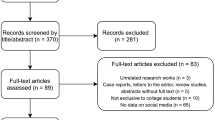Abstract
Background
It is common for Chinese American breast cancer survivors to believe that having cancer is a stigmatizing condition. Little research exists on how this might affect their quality of life (QoL) and through which psychological processes.
Objective
In the present study, we examined the association between self-stigma and QoL in a sample of Chinese American breast cancer survivors and tested the potential mediating roles of intrusive thoughts and posttraumatic growth in this relationship.
Methods
One hundred and thirty-six Chinese American breast cancer survivors completed a questionnaire packet assessing their levels of self-stigma, intrusive thoughts, posttraumatic growth, and QoL.
Results
As hypothesized, findings indicated a significant negative correlation between self-stigma and QoL. Findings from a path analysis indicated significant indirect effects of self-stigma on QoL through intrusive thoughts and posttraumatic growth—the negative correlation between self-stigma and QoL was completely mediated by more intrusive thoughts and less posttraumatic growth.
Conclusions
Our findings suggest that self-stigma may harm QoL among Chinese American breast cancer survivors by leading to more intrusive thoughts and not focusing on posttraumatic growth. To attenuate the negative impact of self-stigma on QoL among Chinese American breast cancer survivors, cognition-focused interventions should be utilized to reduce intrusive thoughts and foster posttraumatic growth.

Similar content being viewed by others
References
Tam Ashing, K., Padilla, G., Tejero, J., & Kagawa-Singer, M. (2003). Understanding the breast cancer experience of Asian American women. Psycho-Oncology, 12(1), 38–58.
Ashing-Giwa, K. T., Padilla, G., Tejero, J., Kraemer, J., Wright, K., Coscarelli, A., et al. (2014). Understanding the breast cancer experience of women: A qualitative study of African American, Asian American, Latina and Caucasian cancer survivors. Psycho-Oncology, 13(6), 408–428.
Crocker, J., Major, B., & Steele, C. (1998). Social stigma. In D. Gilbert, S. T. Fiske, & G. Lindzey (Eds.), The handbook of social psychology (4th ed., pp. 504–553). Boston, MA: McGraw-Hill.
Goffman, E. (1963). Stigma: Notes on the management of spoiled identity. New York: Simon and Schuster.
Link, B. G., & Phelan, J. C. (2001). Conceptualizing stigma. Annual Review of Sociology, 27(1), 363–385.
Hatzenbuehler, M. L., Phelan, J. C., & Link, B. G. (2013). Stigma as a fundamental cause of population health inequalities. American Journal of Public Health, 103(5), 813–821. https://doi.org/10.2105/AJPH.2012.301069.
Major, B., & O’Brien, L. T. (2005). The social psychology of stigma. Annual Review of Psychology, 56, 393–421. https://doi.org/10.1146/annurev.psych.56.091103.070137.
Meyer, I. H. (2003). Prejudice, social stress, and mental health in lesbian, gay, and bisexual populations: Conceptual issues and research evidence. Psychological Bulletin, 129(5), 674–697. https://doi.org/10.1037/0033-2909.129.5.674.
Corrigan, P. W., Larson, J. E., & Ruesch, N. (2009). Self-stigma and the “why try” effect: Impact on life goals and evidence-based practices. World Psychiatry, 8(2), 75–81. https://doi.org/10.1002/j.2051-5545.2009.tb00218.x.
Else-Quest, N. M., & Jackson, T. L. (2014). Cancer stigma. In P. W. Corrigan (Ed.), The stigma of disease and disability: Understanding causes and overcoming injustices (pp. 165–181). Washinton, DC: American Psychological Association.
Knapp, S., Marziliano, A., & Moyer, A. (2014). Identity threat and stigma in cancer patients. Health Psychology Open. https://doi.org/10.1177/2055102914552281.
Lebel, S., & Devins, G. M. (2008). Stigma in cancer patients whose behavior may have contributed to their disease. Future Oncology, 4(5), 717–733. https://doi.org/10.2217/14796694.4.5.717.
Bell, K. (2014). The breast-cancer-ization of cancer survivorship: Implications for experiences of the disease. Social Science and Medicine, 110, 56–63. https://doi.org/10.1016/j.socscimed.2014.03.031.
Kim, M. A., & Yi, J. (2014). Life after cancer: How does public stigma increase psychological distress of childhood cancer survivors? International Journal of Nursing Studies, 5(12), 1605–1614.
Williamson, T. J., Choi, A. K., Kim, J. C., Garon, E. B., Shapiro, J. R., Irwin, M. R., et al. (2018). A longitudinal investigation of internalized stigma, constrained disclosure, and quality of life across 12 weeks in lung cancer patients on active oncologic treatment. Journal of Thoracic Oncology, 13(9), 1284–1293.
Ernst, J., Mehnert, A., Dietz, A., Hornemann, B., & Esser, P. (2017). Perceived stigmatization and its impact on quality of life-results from a large register-based study including breast, colon, prostate and lung cancer patients. BMC cancer, 17(1), 741.
Tripathi, L., Datta, S. S., Agrawal, S. K., Chatterjee, S., & Ahmed, R. (2017). Stigma perceived by women following surgery for breast cancer. Indian Journal of Medical and Paediatric Oncology, 38(2), 146–152.
Cho, J., Choi, E. K., Kim, S. Y., Shin, D. W., Cho, B. L., Kim, C. H., et al. (2013). Association between cancer stigma and depression among cancer survivors: A nationwide survey in Korea. Psycho-Oncology, 22(10), 2372–2378.
Wong-Kim, E., Sun, A., Merighi, J. R., & Chow, E. A. (2005). Understanding quality-of-life issues in Chinese women with breast cancer: A qualitative investigation. Cancer Control, 12, 6–12.
Warmoth, K., Cheung, B., You, J., Yeung, N. C., & Lu, Q. (2017). xploring the social needs and challenges of Chinese American immigrant breast cancer survivors: A qualitative study using an expressive writing approach. International Journal of Behavioral Medicine, 24(6), 827–835.
Hatzenbuehler, M. L. (2009). How does sexual minority stigma “get under the skin”? A psychological mediation framework. Psychological Bulletin, 135(5), 707–730. https://doi.org/10.1037/a0016441.
Lewis, J. A., Manne, S. L., DuHamel, K. N., Vickburg, S. M. J., Bovbjerg, D. H., Currie, V., et al. (2001). Social support, intrusive thoughts, and quality of life in breast cancer survivors. Journal of Behavioral Medicine, 24(3), 231–245. https://doi.org/10.1023/A:1010714722844.
Miller, C. T., & Kaiser, C. R. (2001). A theoretical perspective on coping with stigma. Journal of Social Issues, 57(1), 73–92. https://doi.org/10.1111/0022-4537.00202.
Gonzalez, P., Nuñez, A., Wang-Letzkus, M., Lim, J. W., Flores, K. F., & Nápoles, A. M. (2016). Coping with breast cancer: Reflections from Chinese American, Korean American, and Mexican American women. Health Psychology, 35(1), 19–28. https://doi.org/10.1037/hea0000263.
Taylor, S. E., Lichtman, R. R., & Wood, J. V. (1984). Attributions, beliefs about control, and adjustment to breast cancer. Journal of Personality and Social Psychology, 46(3), 489–502. https://doi.org/10.1037/0022-3514.46.3.489.
Helgeson, V. S., Reynolds, K. A., & Tomich, P. L. (2006). A meta-analytic review of benefit finding and growth. Journal of Consulting and Clinical Psychology, 74(5), 797–816. https://doi.org/10.1037/0022-006X.74.5.797.
Shen, M. J., Coups, E. J., Li, Y., Holland, J. C., Hamann, H. A., & Ostroff, J. S. (2015). The role of posttraumatic growth and timing of quitting smoking as moderators of the relationship between stigma and psychological distress among lung cancer survivors who are former smokers. Psycho-Oncology, 24(6), 683–690. https://doi.org/10.1002/pon.3711.
Lu, Q., Gallagher, M. W., Loh, A., & Young, L. (2018). Expressive writing intervention improves quality of life among Chinese-American breast cancer survivors: A randomized controlled trial. Annals of Behavioral Medicine. https://doi.org/10.1093/abm/kax067.
Thoemmes, F., Mackinnon, D. P., & Reiser, M. R. (2010). Power analysis for complex mediational designs using Monte Carlo Methods. Structural Equation Modeling, 17(3), 510–534.
Tedeschi, R. G., & Calhoun, L. G. (1996). The Posttraumatic Growth Inventory: Measuring the positive legacy of trauma. Journal of Traumatic Stress, 9(3), 455–471. https://doi.org/10.1007/BF02103658.
Brislin, R. W. (1970). Back-translation for cross-cultural research. Journal of Cross-Cultural Psychology, 1(3), 185–216. https://doi.org/10.1177/135910457000100301.
Mak, W. W., & Cheung, R. Y. (2010). Self-stigma among concealable minorities in Hong Kong: Conceptualization and unified measurement. American Journal of Orthopsychiatry, 80(2), 267–281.
Kato, A., Takada, M., & Hashimoto, H. (2014). Reliability and validity of the Japanese version of the Self-Stigma Scale in patients with type 2 diabetes. Health and Quality of Life Outcomes, 12(1), 179. https://doi.org/10.1186/s12955-014-0179-z.
Yang, X., & Mak, W. W. (2016). The differential moderating roles of self-compassion and mindfulness in self-stigma and well-being among people living with mental illness or HIV. Mindfulness, 8(3), 595–602. https://doi.org/10.1007/s12671-016-0635-4.
Yeung, N., Dai, J., Zheng, D., Man, J., Loh, A., Young, L., et al. (2011). Exploration of culturally unique needs and challenges experienced by chinese breast cancer survivors living in the United States: A qualitative study using expressive writing approach. Psycho-oncology, 20(Supplement 1), 92.
Horowitz, M., Wilner, N., & Alvarez, W. (1979). Impact of event scale: A measure of subjective stress. Psychosomatic Medicine, 41(3), 209–218. https://doi.org/10.1097/00006842-197905000-00004.
Chen, S. C., Lai, Y. H., Liao, C. T., & Lin, C. C. (2005). Psychometric testing of the Impact of Event Scale-Chinese Version (IES-C) in oral cancer patients in Taiwan. Supportive Care in Cancer, 13(7), 485–492. https://doi.org/10.1007/s00520-005-0775-x.
Cella, D. F., Tulsky, D. S., Gray, G., Sarafian, B., Linn, E., Bonomi, A., et al. (1993). The functional assessment of cancer therapy scale: Development and validation of the general measure. Journal of Clinical Oncology, 11(3), 570–579. https://doi.org/10.1200/JCO.1993.11.3.570.
Wan, C., Zhang, D., Yang, Z., Tu, X., Tang, W., Feng, C., et al. (2007). Validation of the simplified Chinese version of the FACT-B for measuring quality of life for patients with breast cancer. Breast Cancer Research and Treatment, 106(3), 413–418. https://doi.org/10.1007/s10549-007-9511-1.
Steiger, J. S. (1990). Structural model evaluation and modification: An interval estimation approach. Multivariate Behavioral Research, 25(2), 173–180.
Bentler, P. M. (1990). Comparative fit indexes in structural models. Psychological Bulletin, 107(2), 238–246.
Browne, M. W., & Cudeck, R. (1993). Alternative ways of assessing model fit. In K. Bollen & J. S. Long (Eds.), Testing structural equation models. Newbury Park, CA: Sage.
Muthén LK, & Muthén, B. O. (1998-2016) Mplus User’s Guide, 7th ed. Los Angeles, CA: Muthén & Muthén
Preacher, K. J., & Hayes, A. F. (2008). Asymptotic and resampling strategies for assessing and comparing indirect effects in multiple mediator models. Behavior Research Methods, 40(3), 879–891.
Lu, Q., Yeung, N. C., You, J., & Dai, J. (2016). Using expressive writing to explore thoughts and beliefs about cancer and treatment among Chinese American immigrant breast cancer survivors. Psycho-Oncology, 25(1), 13711374.
Abad, A. N. S., Bakhtiari, M., Kashani, F. L., & Habibi, M. (2016). The comparison of effectiveness of treatment based on acceptance and commitment with cognitive-behavioral therapy in reduction of stress and anxiety in cancer patients. International Journal of Cancer Research and Prevention, 9(3), 229–246.
Zhang, J., Xu, R., Wang, B., & Wang, J. (2016). Effects of mindfulness-based therapy for patients with breast cancer: A systematic review and meta-analysis. Complementary Therapies in Medicine, 26, 1–10. https://doi.org/10.1016/j.ctim.2016.02.012.
Qiu, H., Ren, W., Yang, Y., Zhu, X., Mao, G., Mao, S., et al. (2018). Effects of cognitive behavioral therapy for depression on improving insomnia and quality of life in Chinese women with breast cancer: Results of a randomized, controlled, multicenter trial. Neuropsychiatric Disease and Treatment, 14, 2665–2673.
Zhang, J. Y., Zhou, Y. Q., Feng, Z. W., Fan, Y. N., Zeng, G. C., & Wei, L. (2017). Randomized controlled trial of mindfulness-based stress reduction (MBSR) on posttraumatic growth of Chinese breast cancer survivors. Psychology, Health & Medicine, 22(1), 94–109.
Acknowledgements
The authors would like to thank the Herald Cancer Association for their support in recruiting participants and data collection.
Funding
This study was supported by the American Cancer Society MRSGT-10-011-01-CPPB (PI: Qian Lu).
Author information
Authors and Affiliations
Corresponding author
Ethics declarations
Conflict of interest
All authors do not have any potential conflicts of interest to declare.
Ethical approval
All procedures performed in studies involving human participants were in accordance with the ethical standards of the institutional and/or national research committee and with the 1964 Helsinki declaration and its later amendments or comparable ethical standards (University of Houston IRB Protocol number: 12559-02).
Informed consent
Informed consent was obtained from all individual participants included in the study.
Additional information
Publisher's Note
Springer Nature remains neutral with regard to jurisdictional claims in published maps and institutional affiliations.
Rights and permissions
About this article
Cite this article
Wong, C.C.Y., Pan-Weisz, B.M., Pan-Weisz, T.M. et al. Self-stigma predicts lower quality of life in Chinese American breast cancer survivors: exploring the mediating role of intrusive thoughts and posttraumatic growth. Qual Life Res 28, 2753–2760 (2019). https://doi.org/10.1007/s11136-019-02213-w
Accepted:
Published:
Issue Date:
DOI: https://doi.org/10.1007/s11136-019-02213-w




